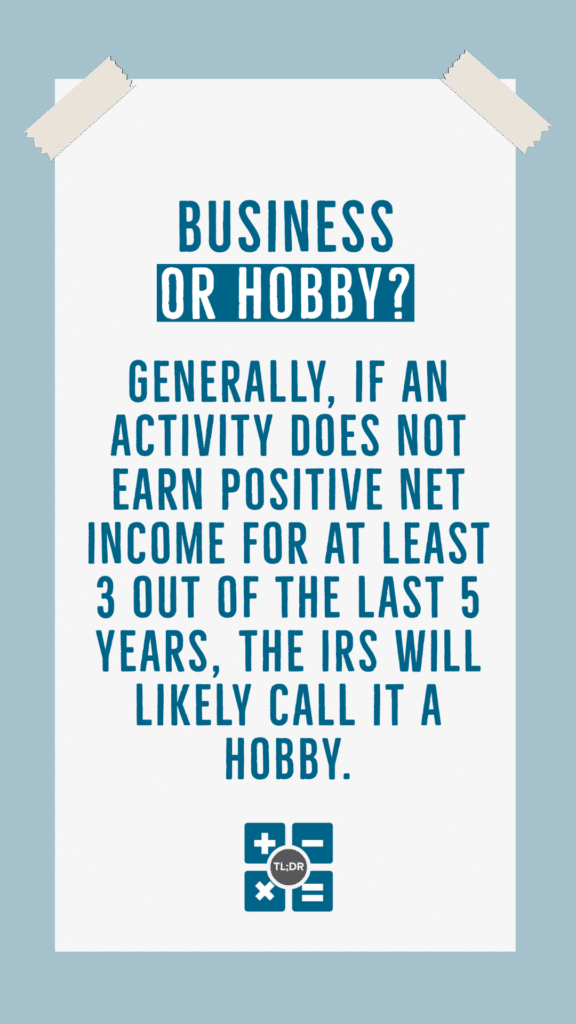Despite the IRS’s best efforts to portray themselves as a fun-loving organization, we feel that they’ve rightfully earned their reputation as the “fun police.” It doesn’t help that there is a particular set of regulations that can feel like it specifically discourages having fun.
This set of regulations is called the Hobby Loss Rules. The purpose of these rules is to make it so that you can’t deduct the expenses borne from having fun. To put it more formally, these rules are there to ensure that business deductions you take on your income taxes are for activities that are meant to earn income.
We’re going to start out by talking about how the Hobby Loss Rules worked a few years ago, then we’ll discuss how the Tax Cuts and Jobs Act (TCJA) of 2017 changed these rules. Then stay with us for the third part: How to maximize your chances of getting those deductions!
Hobby Loss Rules, In General
The Hobby Loss Rules generally work like this:
Generally, the IRS encourages business owners to do everything they need to do in order to run their business efficiently. Specifically, this refers to “ordinary, necessary, reasonable” business expenses.
That said, the IRS understands that allowing business expenses can lead to unintended consequences. Specifically, let’s say you’re into go-kart racing. You spend $5,000 per year on go-karting, and each year you win races that earn you $3,000 in total. The IRS is probably going to call this a hobby because it looks like you’re doing this mostly for fun rather than to earn income.
The ways in which the IRS determines if an activity is a hobby are nuanced and complex, but there is a general rule: If an activity does not earn positive net income for at least 3 out of the last 5 years, the IRS will likely call it a hobby.
If an activity is declared a hobby by the IRS, that means you can only deduct expenses up to your income as regular business expenses. In other words, you can “zero yourself out” but you can’t use your go-kart expenses to offset other income you make. There used to be an exception to this, which we’ll cover below.
The Rules Before 2018
Before 2018, there was a special category on the 1040 tax return for “2% miscellaneous deductions.” If you itemized your deductions, you were able to deduct specific expenses in excess of 2% of your AGI. One of these deductions was hobby expenses up to the amount of income earned from that same hobby.
So in our example, let’s say in 2017 your AGI was $100,000. Multiplying that by 2%, we get $2,000. Your hobby income was $3,000, and your hobby losses exceeded that, so your losses up to income would be $3,000. For each hobby you could only count what exceeded 2% of income ($2,000), so you can see that your hobby deduction for 2017 would have been $1,000 if you itemized.
Rule Changes From the Tax Cuts and Jobs Act
The TCJA completely eliminated the 2% miscellaneous deduction category from the 1040 tax return for everyone for the years 2018 – 2025. This means that you can no longer deduct hobby expenses even if they are limited to income and you itemize and they exceed 2% of your AGI.
This means that there’s a much bigger difference between a hobby and a business — it’s the difference between a full business deduction, and no deduction at all! Even worse, you’re legally required to report (and probably pay tax on) your hobby income, so this puts you in a situation of paying tax on income and being unable to deduct expenses.
Now more than ever, it’s crucial to be able to justify to the IRS that your side activity is a business and not a hobby. Here are some tips on how to help your case:
- Do you take your activity seriously? If you engage in bookkeeping, separate your activity-related expenses in a different account, and seek the help of advisors or consultants, it’s more likely to be seen as a business.
- If you spend a lot of time on your activity, have demonstrated success as an entrepreneur, and have sizable profits (even if you sometimes have big losses), it’s more likely seen as a business.
- Are you wealthy or high-income? The IRS does take this into account, seeing it as more likely that someone with low wealth and low income would be far less likely to spend a lot of time and money on something from which they won’t see a return.
- Lastly, and sadly, it really does matter whether the activity is generally considered to be fun. Your go-kart racing activity sounds pretty fun, right? The IRS is far more likely to consider something un-fun like mowing lawns to be a business activity.
Contact us for advice and strategies for strengthening your case that your side activity is a bona fide business!
TL;DR: Is your activity a business or a hobby? Unfortunately, this distinction is not up to you; it’s the IRS’s decision. This decision is very important because it means the difference between a full business expense deduction and no deduction at all (while keeping in mind that you’re expected to report your activity’s income even if you can’t take deductions for expenses). In short, the best thing you can do to convince the IRS that your activity is a business is to treat it like it’s a business yourself. Take it seriously and try your best to make it profitable!







